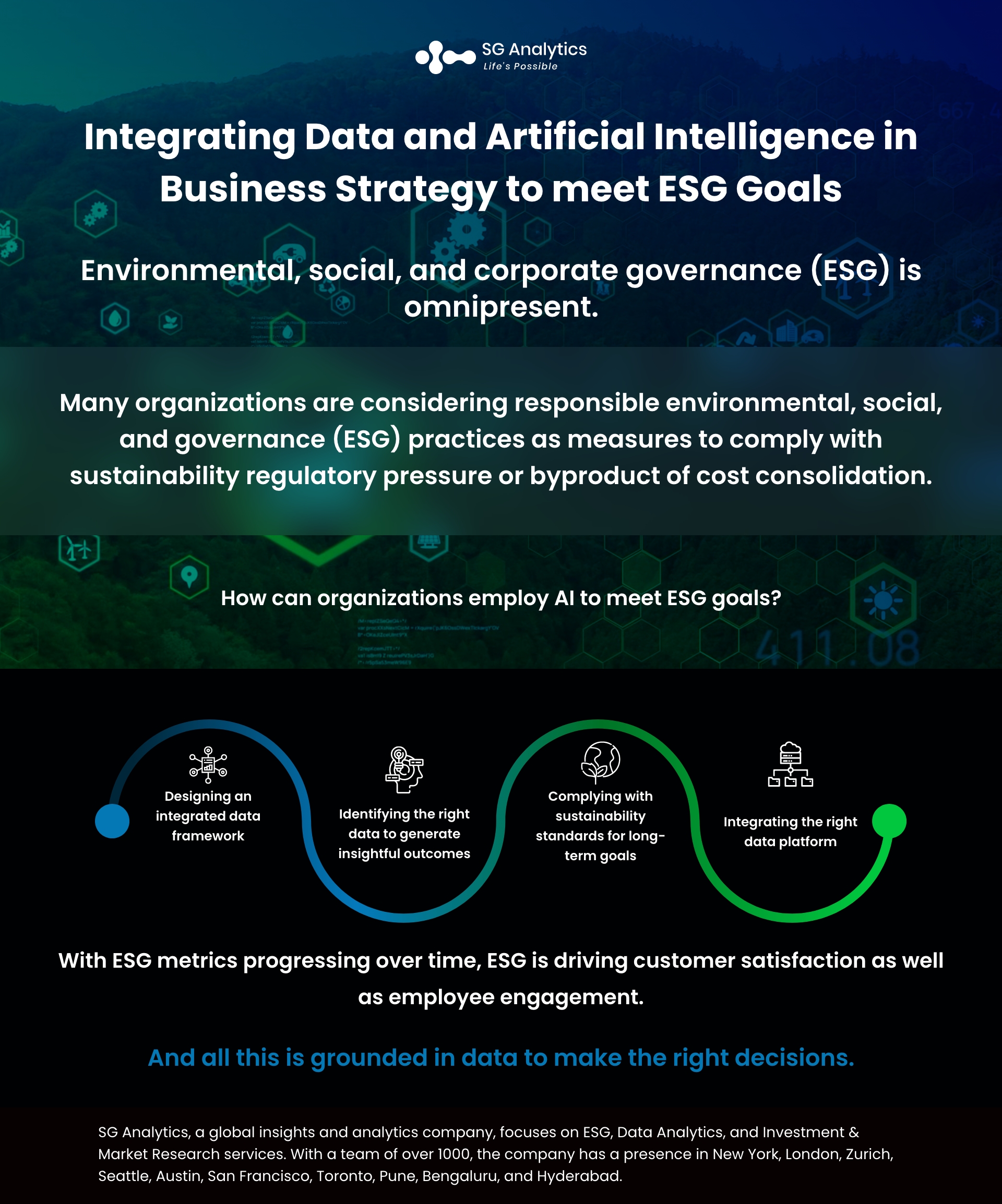Today, environmental, social, and corporate governance (ESG) is omnipresent. And many large corporations are announcing their sustainable and social initiatives. But how does an organization decide what kind of ESG initiative to focus on?
The short answer is based on the accumulated data.
ESG data equips enterprises with the relevant information to determine where to focus their efforts to enhance environmental and social impact. A company needs accurate reporting for informed decision-making as their customers, as well as their investors, are watching.
Many organizations are considering responsible environmental, social, and governance (ESG) practices as measures to comply with sustainability regulatory pressure or byproduct of cost consolidation.
But that is not the case anymore.
Not only is it the right thing, but it has also become a necessity. Companies that are prioritizing ESG and sustainability efforts to experience customer loyalty, employee engagement, as well as talent attraction. It also helps them in gaining a sense of purpose while following more stringent regulations to come. Consumer interest in sustainable and socially conscious purchases is intensifying despite global economic crises like inflation.
Read more: Sustainability Outlook: Top Emerging Trends in 2023 and Beyond

ESG Data Commitments
ESG data from rating agencies is essential, but there are many concerns that surround the quality of this data. The collected data can have a high degree of subjectivity based on the rating on ESG criteria, as it relies heavily on information facilitated by the companies.
As the ESG ratings of companies are reviewed infrequently, the direction of revisions tends to be strongly correlated with their financial performance
Large discrepancies among the ratings are likely to occur due to the different methodologies used to deal with the missing data.
Today, more than 75% of younger shoppers are prioritizing ESG issues when making purchase decisions. Consumers are buying products from enterprises committed to ESG goals. They are even willing to pay a premium price for the same product from an organization that is committed to sustainability goals.
Companies need to clearly define ESG commitments and risk losing not only their market share but also their top talent. Industry executives are also feeling pressure from all sides to demonstrate their ESG record.
Businesses need to establish a high-level commitment to achieve their ESG goals. To add measurability to their ESG outcomes, business leaders are integrating artificial intelligence into their operations.
Read more: The Next Tech Time Warp: How Will Artificial Intelligence Possibly Change the World?

How can Organizations employ AI to meet ESG goals?
-
Designing an Integrated Data Framework
It is a known fact that an organization already generates enough data to design AI models that could assist them in meeting its ESG goals. But the downside to this is that the generated data probably can’t be used.
While an organization can have all this data, it cannot use it directly in its raw form. This data is held across different business units, either unstructured or structured. This data cannot be utilized to serve traditional business goals, let alone ESG. It is, therefore, critical to define ESG outcomes and connect them to the overall business framework.
Businesses should integrate their processes with ESG and weave them into their business goals. They cannot design a data strategy for their business operations and a separate strategy for their ESG goals. They should be intertwined. ESG outcomes should be forecast against internal and external factors.
With the right partnership, businesses can navigate through the ESG landscape by creating and streamlining their cross-company coalescence around a set ESG goal. To chart a path toward sustainable growth, businesses should create and integrate their areas of operations with ESG values to cater to the need of their existing consumers and community.

-
Identifying the Right Data to Generate Insightful Outcomes
Not all ESG outcomes are equal. Every ESG goal requires its own datasets. It is, therefore, crucial for businesses to understand how and where to find this data. Businesses need to digitize and integrate their structured data to respond to changing market demands.
Organizations have started integrating and applying artificial intelligence and machine learning to their data centers to optimize and generate precise reports. By designing AI frameworks based on this data, businesses can determine where sectors to optimize efficiency for business growth. AI is also assisting them in identifying their operational workloads that should be consolidated and moved to the cloud.
By applying AI and ML to track data sets, businesses can generate structured data reports and point out the exposure to different sustainable opportunities. The data was then employed to build predictive AI models for further analytical report generation.
Read more: Trends in Big Data Analytics: Forecast for 2023
-
Complying with Sustainability Standards for Long-Term Goals
The whole point of integrating ESG values into operations is to make the world a better place. However, businesses should be careful to avoid a single-use mind frame. For any organization, ESG should not be a one-time project. It should be a core program that is driven by commitment. It requires continuous involvement from different stakeholders across the company. However, the absence of key performance indicators, or KPIs, contributes to a short-term mindset for many organizations. And this uncertainty is prompting many to celebrate too soon when their ESG journey is just getting started. Every industry is perceiving ESG from a different lens in terms of KPIs as well as the measures and goals they want to achieve.

While there are no set standards for companies globally to disclose their ESG or sustainability reports, many countries are advancing to help ESG goal-setting and tracking. They are establishing new measures to set more ambitious regulatory standards. While failure is likely to follow these regulations, the set standard is likely to assist organizations that are longer ignoring to factor the sustainability and ESG impacts in their overall strategy.
-
Integrating the Right Data Platform
With many service providers in the market, business executives and decision-makers are likely to feel easily overwhelmed. However, in terms of data operations, they must be critical to identify and integrate the right solutions in place. Organizations already have different data warehouses and data lakes, and with new data coming in along with external data, they can synthesize and harmonize the information to make an informed decision.
To keep up with ever-changing technical demands, organizations are integrating a data fabric approach that is enabling them to create an architecture of resilient data pipelines. With good data architecture, businesses can better accommodate several data sources and integrate the information made available by the AI framework for analysis.

Key Highlights:
-
Artificial Intelligence (AI) is enabling organizations to circumvent the challenges with traditional ESG data.
-
Textual and satellite data analysis enables businesses to identify the key ESG risks as well as opportunities.
-
AI is contributing to a company's ESG integration by offering an alternative data source to monitor ESG reporting.
Read more: The ESG Rating Phenomenon: A Guide to Understand ESG Ratings

Driving ESG Results for a Sustainable Future
Companies are now integrating measures to satisfy and fulfill their ESG demands by announcing new initiatives for building sustainability and impacting communities.
Unless pressed for details by investors, they were not expected to follow up with hard data. The time to understand different perspectives has gone; it is time to implement actions for real business impact. Due to a large part to AI and other analytics tools, ESG outcomes are now measurable for businesses against public benchmarks.
The public is not looking for perfection; they are looking for progress. With ESG metrics progressing over time, ESG is driving customer satisfaction as well as employee engagement. And all this is grounded in data to make the right decisions.
With a presence in New York, San Francisco, Austin, Seattle, Toronto, London, Zurich, Pune, Bengaluru, and Hyderabad, SG Analytics, a pioneer in Research and Analytics, offers tailor-made services to enterprises worldwide.
A leader in ESG Services, SG Analytics offers bespoke sustainability consulting services and research support for informed decision-making. Contact us today if you are in search of an efficient ESG integration and management solution provider to boost your sustainable performance.









